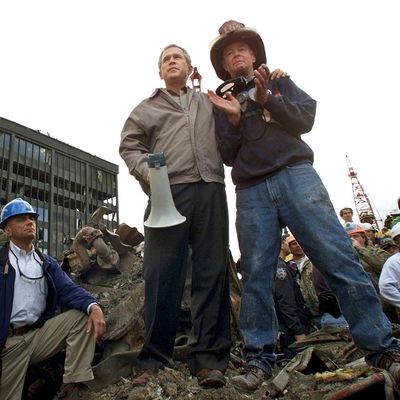
By now nearly everybody, with the exception of a handful of Bush administration leftovers, understands that the September 11 attacks induced some form of mass psychosis into the American polity. The contours of this understanding vary. Nearly everybody now agrees that the post-9/11 impulse to divide the world into a Manichaean contest between Islamic terrorism and democracy was tragically misguided. A smaller group of Americans understands that the rally-around-the-flag atmosphere canonized and empowered a series of deeply unworthy figures, ranging from Rudy Giuliani to Dick Cheney to George W. Bush, on the basis of their ability to act out some ideal of masculinity.
Yet there remains one important post-9/11 belief that has yet to undergo significant revision: the comforting fallacy that George W. Bush won the 2000 election more or less fairly.
Bush won the election because five Republican-appointed Supreme Court justices overruled the Florida State Supreme Court and blocked a statewide ballot recount. A consortium of newspapers undertook its own recount. By an unfortunate accident of timing, those results came out in November 2001, when post-attack hysteria was at an apogee. A broad bipartisan consensus held that the paramount national imperative was to unify behind a president protecting the country from existential and ongoing threats. At the time, public pressure to rally around Bush and suppress any questions about his legitimacy was so intense that the mere decision to publish the findings at all provoked controversy.
Newspapers generally handled this pressure by presenting their results in the most delicate, Bush-friendly way. The Washington Post headlined its story, “Florida Recounts Would Have Favored Bush.” The New York Times report was headlined, “EXAMINING THE VOTE: THE OVERVIEW; Study of Disputed Florida Ballots Finds Justices Did Not Cast the Deciding Vote.”
These summaries were at best oversimplistic, and at worst outright false. But they registered in the public consciousness so deeply that most people believe those conclusions to this day.
The actual results of the recount was that Al Gore’s narrow winning margin would have been provided by a cache of “overvotes ” — ballots that were discarded by machine counts because they registered two votes for president, but which were revealed by hand inspection to show a clear choice. (These voters had marked Gore’s name, and then wrote his name in, causing the machines to discard them as a double vote.)
The result of the recount would have depended on whether the officials conducting the recount examined these overvote ballots. It can’t be proven either way. The major newspapers chose to assume that the overvotes would have been ignored in a recount, triggering a Bush victory. That assumption allowed them to fall back on the (then) safe and comforting conclusion that the recount would not have changed the outcome.
But it was just that — an assumption. The national media made no effort to test this assumption. Only the Orlando Sentinel bothered to ask Terry Lewis, the judge who had been overseeing the recount, about it. Lewis replied that he likely would have examined overvotes, a method that would have resulted in Gore winning. But none of the major media paid any attention to this significant finding or saw fit to revise the conclusions they had splashed out.
It’s difficult to convey to those who didn’t experience it the overwhelming force of the pro-administration Zeitgeist. I did not work in a major media newsroom at the time, so I can’t report firsthand on the calculations that caused those outlets to leap to a pro-Bush conclusion they hadn’t bothered to substantiate. I did work for a center-left opinion magazine, and I had to push back as hard as I ever had to resist my editor’s desire for me to publish a story ratifying the pro-Bush interpretation of the recount. The story that ran questioned the official narrative while backing into its important conclusion that Gore probably would have prevailed. My conclusion was almost apologetic:
The media’s impulse to exonerate Bush is understandable. Nobody wants to appear sour or partisan, or to shatter the unity necessary to prosecute the war on terrorism. But accepting the finality of the election and unifying against enemies abroad does not necessarily conflict with the idea that the president holds office due to bungling compounded by deliberate wrongdoing. We really ought to be able to hold both ideas in our heads at once.
Even Al Gore himself did not feel emboldened enough to supply a pro-Gore interpretation of the recount, instead nodding to the importance of rallying around Bush’s leadership in the emerging war on terror. “As I said on Dec. 13th of last year, we are a nation of laws and the presidential election of 2000 is over,” he wrote in a statement. “And of course, right now our country faces a great challenge as we seek to successfully combat terrorism. I fully support President Bush’s efforts to achieve that goal.”
The perspective of history renders Gore’s nonanswer much more revealing than it seemed at the time. His answer turned the subtext of the media’s coverage of the issue — Bush’s status as unchallengeable leader against the terrorist threat — into the text.
Twenty years on, not only does the impulse to follow Bush’s foreign policy look worse, but so too does the impulse to overlook the method by which he gained his office. His party’s terrifying will to power, including mobs shutting down a legitimate government proceeding over groundless fears that Democratic cities would manufacture fake votes, was an eerie precursor to its future. The truth we’ve suppressed is that Bush not only misused his office, but never should have held it in the first place.






























